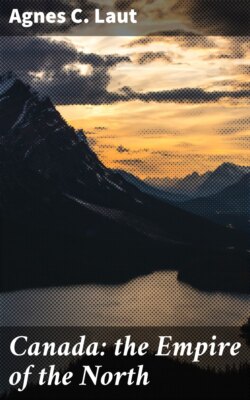Читать книгу Canada: the Empire of the North - Agnes C. Laut - Страница 36
На сайте Литреса книга снята с продажи.
PORT ROYAL (From Champlain's diagram)
ОглавлениеZigzagging along the coast of Maine, Captain Fleury cast anchor off Mount Desert at Frenchman's Bay. A cross was erected, mass celebrated, and four white tents pitched to house the people; but the clash between civil and religious authority broke out again. The sailors would not obey the priests. Fleury feared mutiny. Saussaye, the commander, lost his head, and disorder was ripening to disaster when there appeared over the sea the peak of a sail—a sail topped by a little red ensign, the flag of the English, who claimed all this coast. And the sail was succeeded by decks with sixty mariners, and hulls through whose ports bristled fourteen cannon. The newcomer was Samuel Argall of Virginia, whom the Indians had told of the French, now bearing down full sail, cannon leveled, to expel these aliens from the domain of England's King. Drums were beating, trumpets blowing, fifes shrieking—there was no mistaking the purpose of the English ship. Saussaye, the French commander, dashed for hiding in the woods. Captain Fleury screamed for some one, every one, any one, "to fire—fire"; but the French sailors had imitated their commander and fled to the woods, while the poor Jesuit, Gilbert du Thet, fell weltering in blood from an English cannonade that swept the French decks bare and set all sails in flame. In the twinkling of an eye, Argall had captured men and craft. Fifteen of the French prisoners he set adrift in open boat, on the chance of their joining the French fishing fleet off Cape Breton. They were ultimately carried to St. Malo. The rest of the prisoners, including Father Biard, he took back to Virginia, where the commission held from the French King assured them honorable treatment in time of peace; but Argall was promptly sent north again with his prisoners, and three frigates to lay waste every vestige of French settlement from Maine to St. John. Mount Desert, the ruins of Ste. Croix, the fortress beloved by Poutrincourt at Port Royal, the ripening wheat of Annapolis Basin—all fed the flames of Argall's zeal; and young Biencourt's wood runners, watching from the forests the destruction of all their hopes, the ruin of all their plans, ardently begged their young commander to parley with Argall that they might obtain the Jesuit Biard and hang him to the highest tree. To his coming they attributed all the woes. It was as easy for them to believe that the Jesuit had piloted the English destroyer to Port Royal, as it had been ten years before for the Catholics to accuse the Huguenots of murdering the lost priest Aubry; and there was probably as much truth in one charge as the other.
So fell Port Royal; but out round the ruins of Port Royal, where the little river runs down to the sea past Goat Island, young Biencourt and his followers took to the woods—the first of that race of bush lopers, half savages, half noblemen, to render France such glorious service in the New World.
When De Monts lost the monopoly of furs in Acadia, Champlain, the court geographer, had gone home from Port Royal to France. De Monts now succeeds in obtaining a fresh monopoly for one year on the St. Lawrence, and sends out two ships in 1608 under his old friends, Pontgravé, who is to attend to the bartering, Champlain, who is to explore. With them come some of the colonists from Port Royal, among others Louis Hebert, the chemist, first colonist to become farmer at Quebec, and Abraham Martin, whose name was given to the famous plains where Wolfe and Montcalm later fought.
Pontgravé arrived at the rendezvous of Tadoussac early in June. Here he found Basque fishermen engaged in the peltry traffic with Indians from Labrador. When Pontgravé read his commission interdicting all ships but those of De Monts from trade, the Basques poured a fusillade of musketry across his decks, killed one man, wounded two, then boarded his vessel and trundled his cannon ashore. So much for royal commissions and monopoly!
